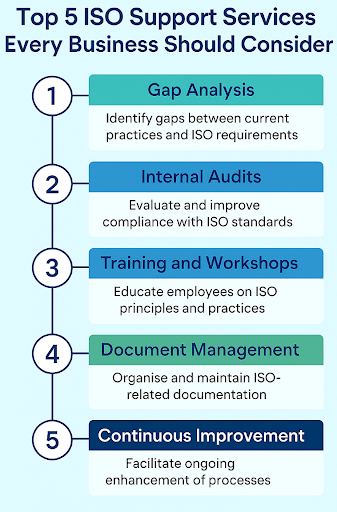Getting ISO certified shows that you care about quality, safety, and consistency and that you’re serious about improving.
But let’s be honest, keeping up with ISO standards can be a handful. Between documentation, internal checks, and training your team, it’s easy to feel buried in admin. That’s where ISO support services help. They make the whole process smoother, clearer, and far more manageable.
Here are five types of support that can take the pressure off and help you keep your certification on track.
Start with a proper check-up
Before you make any changes, you need to know where you stand. That’s what a gap analysis is for.
Think of it like a health check for your management system. An ISO consultant will look at how your business currently works and compare it with the standard you’re aiming for, whether that’s quality, environmental, or health and safety.
You’ll see exactly what’s working, what’s missing, and where to focus your energy. Maybe your processes are fine but you’re missing some documented evidence. Or maybe your records are solid, but your staff need training.
A proper check-up saves you time later and makes the whole certification journey less stressful.
Also read: ISO Certification Lifecycle Explained

Keep yourself audit-ready all year
Audits shouldn’t be something you dread once a year. If you look after your management system properly, the certification audit becomes just another step in a process you already know.
Regular internal audits help with that. Having an independent auditor take a look can be really useful. They’ll spot things you might not notice because you’re too close to them. And if something’s slipping, you’ll know early and long before it becomes a problem in your official audit.
Audits aren’t just about compliance either. They can highlight ways to make your business run better. A process that feels clunky or repetitive? That’s exactly the kind of thing a good internal audit will catch.
When you stay on top of it, there’s no panic before inspection time. You’ll already be ready.
Want to avoid the most common ISO mistakes businesses make?
Read our quick guide to ISO Mistakes before your next audit.
Make sure your team understands the “why”
No ISO system can work without people. That’s why training is so valuable.
When people see how their job connects to the bigger system, they start to take ownership. A production worker might start noticing patterns in defects. A manager might spot a better way to record performance data. Suddenly, compliance is a habit that improves how you work.
Training also helps keep knowledge alive when staff move on. Instead of depending on one person who “knows the system,” you build a culture where everyone understands it. That’s when ISO stops feeling like an extra job and starts becoming part of your everyday routine.
Get your paperwork under control
Let’s face it, ISO and paperwork go hand in hand. Policies, procedures, forms, and records matter, but they can easily pile up.
Good document management makes life much easier. It means you always know where things are, which version is current, and who last updated it. You’re not digging through emails or old folders the day before an audit.
A proper document control system doesn’t have to be fancy. It just has to work for your business. That could mean switching to a simple digital system that tracks updates automatically, or setting up a shared space where everything is kept in one place.
When your documents are organised, your whole ISO system feels lighter. Auditors can find what they need, your staff can work more efficiently, and you stop losing time to avoidable chaos.
Keep improving, not just maintaining
Once you’ve got your ISO certificate, the real work begins.
Continuous improvement helps you review what’s working, spotting what isn’t, and making small, steady changes that keep your system relevant.
A good ISO consultant will help you review your audits, analyse performance data, and look at customer feedback to see what can be better. Maybe a form could be simplified. Maybe a process could be made faster. These small improvements build up over time, and they’re what separate businesses that just “have ISO” from those that actually use it.
Continuous improvement turns ISO from a compliance task into a business advantage. It helps you run more efficiently, impress clients, and adapt as your company grows.
Why professional ISO support makes all the difference
Trying to handle ISO certification completely on your own can work, but it’s rarely easy. The standards are detailed and it’s easy to lose track of what needs doing. Having a bit of expert support saves time, reduces stress, and helps you focus on what you do best.
A good ISO partner doesn’t just know the standards inside out. They know how to apply them in real life. They understand how to make a management system fit your business instead of forcing you into a rigid template.
That means fewer sleepless nights before audits, fewer surprises, and a system that actually adds value instead of creating extra work.
Make ISO work for you
With the right support, ISO becomes a tool for growth, not a burden. You save time, your team works better together, and your customers trust that you’ll deliver what you promise.
Our team helps businesses at every stage of the process, from first-time certifications to maintaining and improving existing systems. We make sure your management system fits how you actually work and keeps improving over time.
If you’re ready to make ISO work for your business, we’re here to help you do it the easy way.
Request a free consultation today!
Frequently Asked Questions
How long does ISO certification typically take?
With professional support, most organisations achieve certification in 6-12 months. Without support, the timeline often extends to 18-24 months.
Can we pursue multiple ISO standards simultaneously?
Yes. Integrated management systems can reduce implementation time and costs by 30-40% when pursuing multiple standards.
What’s the difference between a consultant and a certification body?
Consultants help you prepare for certification. Certification bodies are independent organisations that conduct the official audit and issue certificates.




